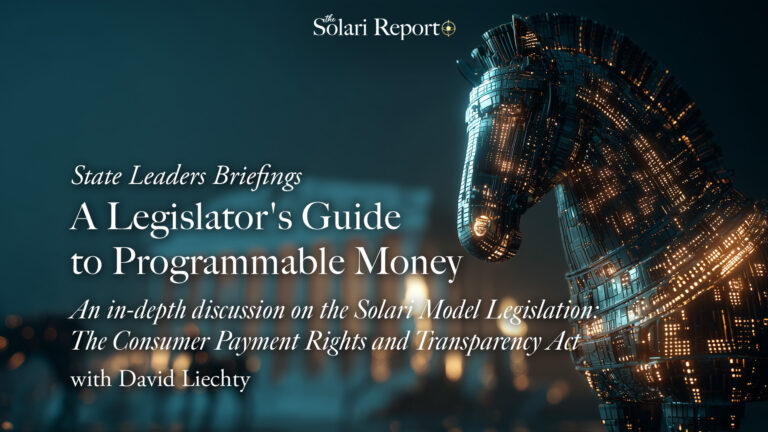
The U.S. Statutes Creating Modern Constitutional Financial Management and Reporting Requirements and the Government's Failure to Follow Them
Become a member: Subscribe
- Money & Markets
- Weekly Solari Reports
- Cognitive Liberty
- Young Builders
- Ask Catherine
- News Trends & Stories
- Equity Overview
- War For Bankocracy
- Digital Money, Digital Control
- State Leader Briefings
- Food
- Food for the Soul
- Future Science
- Health
- Metanoia
- Solutions
- Spiritual Science
- Wellness
- Building Weatlh
- Via Europa
Solari’s Building Wealth materials are organized to inspire and support your personal strategic and financial planning.

Missing Money
Articles and video discussions of the $21 Trillion dollars missing from the U.S. government
No posts
- LATEST
- TOP SECTIONS
- SERIES
- Money & Markets
- Weekly Solari Reports
- Ask Catherine
- News Trends & Stories
- Equity Overview
- Cognitive Liberty
- Young Builders
- Building Wealth
- The War for Bankocracy
- Digital Money, Digital Control
- State Leader Briefings
- Food
- Food for the Soul
- Future Science
- Health
- Metanoia
- Solutions
- Spiritual Science
- Wellness
- Via Europa
- BLOGS
- RESOURCES
- COMMUNITY
- My Account
- Log In
- Subscribe
- Search
- Shop
- Support
- Donate
- Log Out
The Papers
$21 Trillion Missing
- Missing Money 2021 Update
- Missing Money 2020 Update
- Thrift Savings Fund—Treasury Account 026×61531
- FASAB Standard 56 and the Authority of the Director of National Intelligence to Waive SEC Financial Reporting
News Coverage
Video Page
Case Studies
Space: The New Frontier For The Central Control Grid
Legal Series – US Monetary and Fiscal Operations
- he Appropriations Clause: A History of the Constitution’s (As of Yet) Underused Clause
- The U.S. Statutes Creating Modern Constitutional Financial Management and Reporting Requirements and the Government’s Failure to Follow Them
- The Black Budget: The Crossroads of (Un)Constitutional Appropriations and Reporting
- FASAB Statement 56: Understanding New Government Financial Accounting Loopholes
- National Security Exemptions and SEC Rule 10b-5
- Classification for Investors 101
- The History and Organization of the Federal Reserve: The What and Why of the United States’ Most Powerful Banking Organization
FASAB Statement 56
Missing Money Chronology
#my212020 & #constantamazement
The Real Game of Missing Money
- FASAB Standard 56 and the Authority of the Director of National Intelligence to Waive SEC Financial Reporting
- Should We Care about Secrecy in Financial Reporting?
- Reports on “Unsupported Journal Voucher Adjustments” for DOD & HUD
- Contractors, Investors, and Dealers
- Missing Money: A Personal History – 1989 to 2019
- Coming Clean Beyond the Fiscal Cliff
The Financial Coup & Missing Money: Quotes
Caveat Emptor
Dillon Read
Lighthouse Economics
The U.S. Statutes Creating Modern Constitutional Financial Management and Reporting Requirements and the Government’s Failure to Follow Them

“About 34 percent of the federal government’s reported total assets as of September 30, 2016, and approximately 18 percent of the federal government’s reported net cost for fiscal year 2016 relate to significant federal entities that, as of the date of GAO’s audit report, were unable to issue audited financial statements, were unable to receive audit opinions on the complete set of financial statements, or received a disclaimer of opinion on their fiscal year 2016 financial statements.” (U.S. Gov. Accountability Office, GAO-17-283R, U.S. Government’s 2016 and 2015 Consolidated Financial Statements, (2017) at forward 1, available at https://www.gao.gov/products/GAO-17-283R).
By Michele Ferri and Jonathan Lurie
Table of Contents
I. Introduction
II. Statement and Accounts Legislation
A. Framework Statute Exceptions
B. Federal Financial Managers Integrity Act of 1982
C. Chief Financial Officers Act of 1990
D. Federal Credit Reform Act of 1990
E. Government Performance and Results Act
F. Government Management Reform Act
G. Federal Financial Management Improvement Act of 1996
III. Statement and Accounts Shenanigans
A. Agencies Failure to Report
B. Missing Money
IV. The Black Budget
V. Conclusion
VI. About Us
Related Reading
The Appropriations Clause: A History of the Constitution’s (As of Yet) Underused Clause
Coming Up: The Black Budget: The Crossroads of (Un)Constitutional Appropriations and Reporting
Related Sites
Our mission is to help you live a free and inspired life. This includes building wealth in ways that build real wealth in the wider economy. We believe that personal and family wealth is a critical ingredient of both individual freedom and community, health and well-being.
Nothing on The Solari Report should be taken as individual investment, legal, or medical advice. Anyone seeking investment, legal, medical, or other professional advice for his or her personal situation is advised to seek out a qualified advisor or advisors and provide as much information as possible to the advisor in order that such advisor can take into account all relevant circumstances, objectives, and risks before rendering an opinion as to the appropriate strategy.
Be the first to know about new articles, series and events.




















































































































